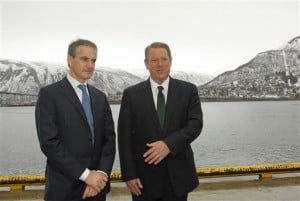This is a busy week for the normally sleepy town of Tromsø, Norway a city over 200 miles north of the Arctic Circle, as it is hosting two conferences: one on global warming, and the annual Arctic Council meeting.
Global Warming Conference
On Tuesday, Norwegian Foreign Minister Jonas Gahr Støre and former Vice President Al Gore co-chaired an international conference on global warming called “Melting Ice: Regional Dramas, Global Wake-Up Call.” Several foreign ministers of Arctic nations were in attendance, along with scientists from regions like the Himalayas and the Andes, where the high-altitude ice is also melting. In fact, the Himalayas and the Tibetan Plateau are often called the “Third Pole” due to the area’s massive ice coverage, which is the third-largest in the world outside the Arctic and Antarctic. Anywhere from 3,000 to 45,000 glaciers glide through the mountains, and two billion people depend on their runoff for water.

FM Støre and Al Gore. AP Photo/Rune Stoltz Bertinussen/Scanpix Norway
At the conference, results of a new scientific study were revealed showing that the sea level could increase three feet by the end of the century. If all of Greenland melted, sea level would rise 23 feet, and if all of Antarctica melted, it would rise 230 feet – rather dire statistics. To study the melting more in-depth, a scientific task force will meet before the international summit takes place in Copenhagen in December. Meanwhile, Foreign Minister Støre discussed measures that could be taken more quickly, such as reducing soot emissions.
Gore underscored the urgency of the climate situation, commenting on the increasing rate of ice, glacier, and permafrost melt.
“This conference is a global wake-up call. The ice is melting faster than the worst-case projections of only a few years ago in the Arctic and in Greenland. The ice is also melting in West Antarctica and in mountainous regions across the globe. Moreover, the permafrost is thawing and beginning to release methane. The scientific evidence for action in Copenhagen in December is continuing to build up week by week.”
Gore also spoke of two tipping points, one good and one bad.
First, he warned against letting the melting “cross the tipping point,” at which point it would be much more difficult to reverse the situation.
But secondly, he observed, “The leadership shown by the Obama administration gives me hope that we now have reached a tipping point in favour of reaching a global agreement on the need for action on climate change.”
We’ll just have to wait and see whether the pendulum swings backwards from that point, towards even more melting, or forwards, towards a concerted global effort to tackle climate change. But the outlook is bright for an international agreement, since the U.S. does indeed seem determined to hammer out an international agreement.
Deputy Secretary of State James Steinberg said, “Too often the problem we have had is that by pursuing too narrow a definition of our national interest we don’t in the end benefit our own people, much less deal with these transnational problems” like global warming.
I think “too often” is code for administration of the past eight years. Of course, signing an international treaty is one thing, while actually adhering to its requirements is another. Even Norway, which let’s not forget is the world’s fourth largest exporter of oil, has found ways to get around carbon dioxide emission rules by supporting environmental conservation projects abroad instead of cutting its own emissions.
Other links:
“Gore calls melting ice a global wake-up call,” Norwegian Ministry of Foreign Affairs
“Gore pleads for rapid action to halt ice-melt,” AFP
On the “Third Pole”:
“An uncertain future on the Plateau,” China Dialogue
“Third Pole Melting,” Ole Nielsen